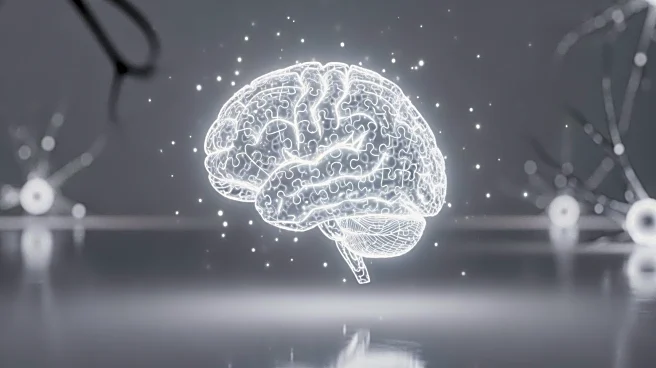What's Happening?
A recent study conducted by neurology researchers at McGill University, published in the journal JMIR Serious Games, has revealed that playing specific brain-training games can significantly improve focus
and attention. The study involved 92 participants aged 65 and older, who were divided into two groups. One group engaged in brain-training games for 30 minutes daily over a period of 10 weeks, while the other group played games purely for entertainment. The researchers utilized positron emission tomography (PET) scans to measure the production of acetylcholine, a chemical associated with attention, in the participants' brains. Results indicated a 2.3% increase in acetylcholine production in the group that played brain-training games, suggesting enhanced attention capabilities.
Why It's Important?
The findings of this study are significant as they suggest a non-pharmacological method to potentially improve cognitive functions, particularly in older adults. As acetylcholine production naturally declines with age, the ability to boost its production through brain-training games could offer a valuable tool for maintaining cognitive health. This could have broader implications for public health strategies aimed at aging populations, potentially reducing the burden on healthcare systems by delaying cognitive decline. Additionally, the study's insights could influence the development of cognitive training programs and apps, benefiting both older adults and younger individuals seeking to enhance their focus and attention.
What's Next?
Following these findings, there may be increased interest in developing and marketing brain-training games specifically designed to enhance cognitive functions. Researchers might also explore the applicability of these games to younger demographics and individuals with attention-related disorders. Healthcare providers could consider incorporating brain-training exercises into cognitive health recommendations for older adults. Further studies could be conducted to explore the long-term effects of such training and its potential integration into routine cognitive health maintenance.
Beyond the Headlines
The study highlights the potential for brain-training games to drive biological changes in the brain, specifically targeting the cholinergic system responsible for producing acetylcholine. This underscores the broader impact of cognitive exercises on various aspects of brain function, including learning, behavior, and mood. The research may also prompt discussions on the ethical considerations of using digital interventions in cognitive health, particularly concerning accessibility and the digital divide among older populations.









